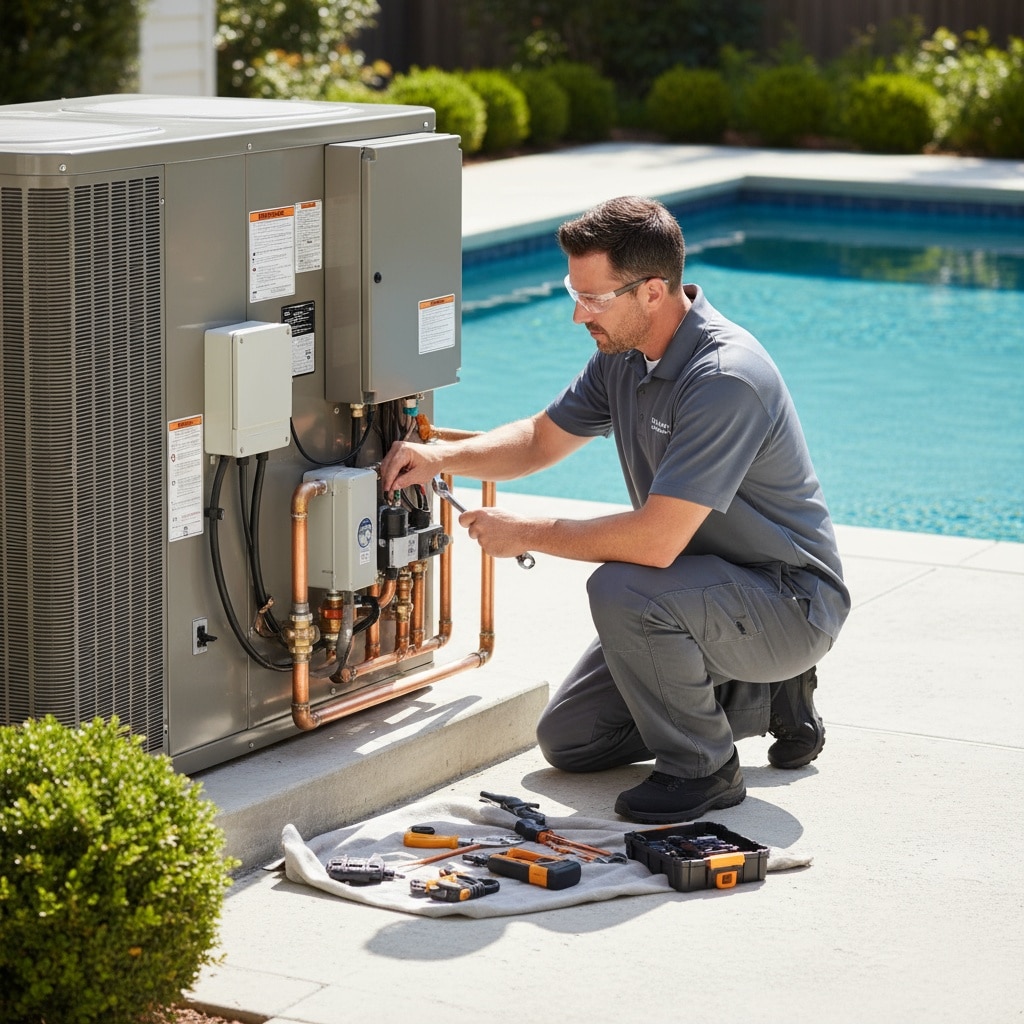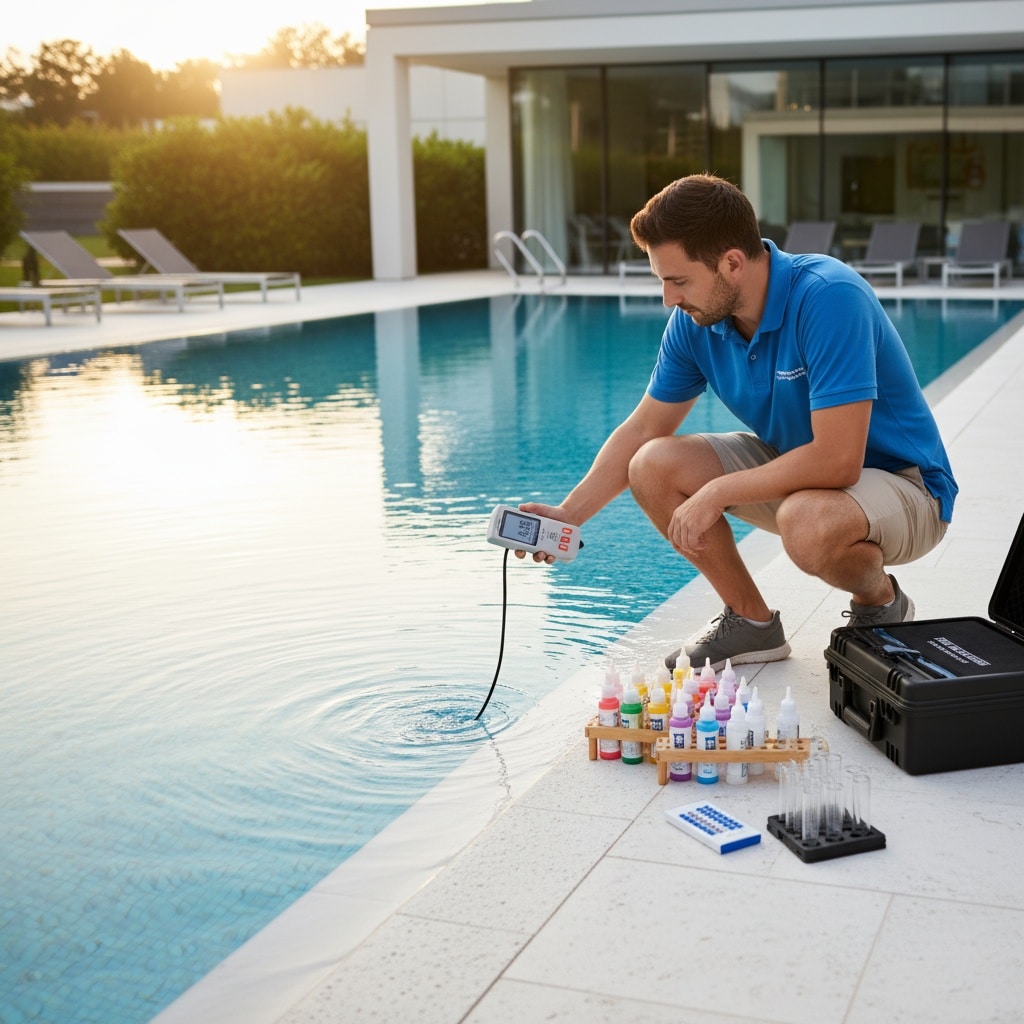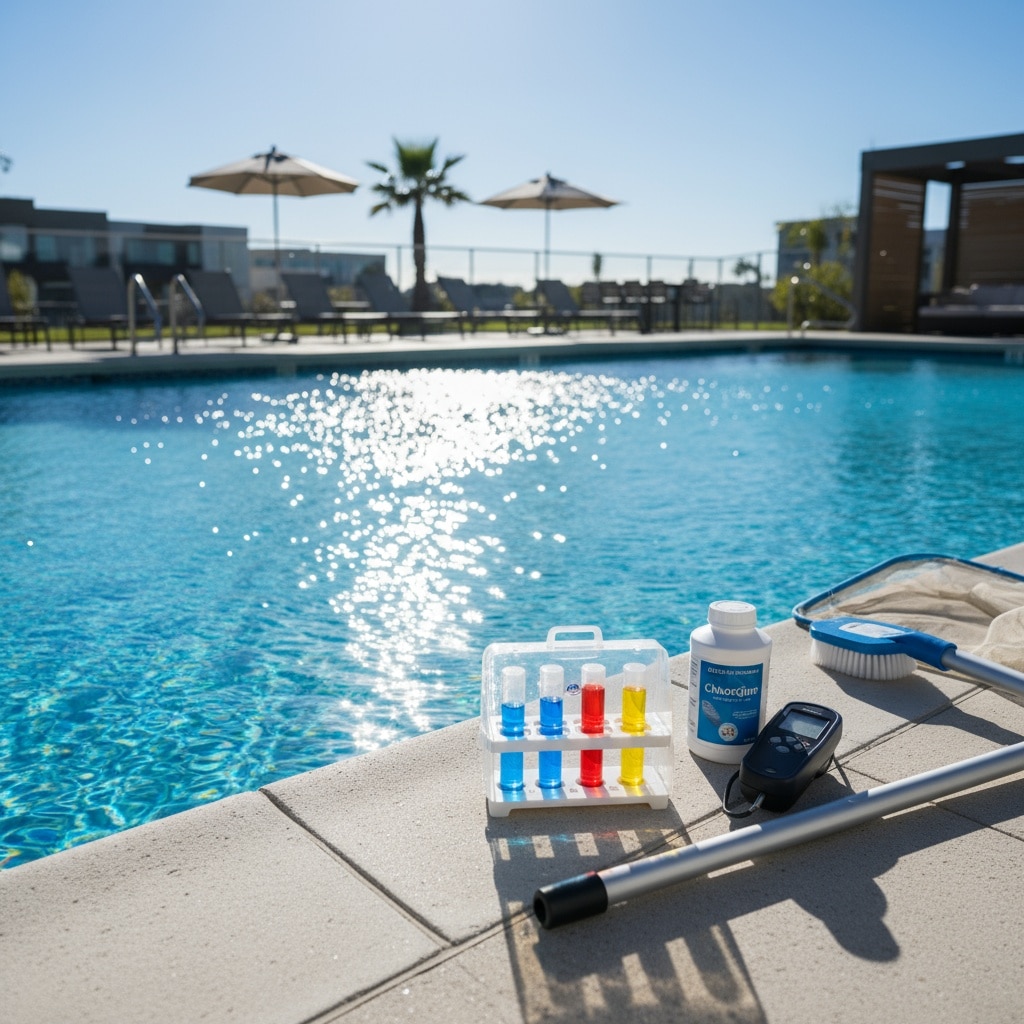You’ve decided to build a backyard pool—but now comes the big question: saltwater or chlorine? It’s not just a matter of taste. The pool system you choose will impact your skin health, maintenance routines, long-term costs, and even how your swimsuit holds up.
While chlorine has long been the standard, saltwater systems are growing in popularity for their gentle feel and lower chemical usage. But they’re not necessarily easier—or cheaper—in the long run.
In this guide, we’ll break down the key differences, pros and cons, maintenance factors, and health considerations of each system so you can confidently choose the best fit for your home, lifestyle, and budget.

Schedule Your Pool Service Today
1. Saltwater vs. Chlorine Pools: What’s the Difference?
When it comes to pool sanitization, the primary distinction between saltwater and chlorine pools lies in how chlorine is delivered into the water—and how that affects maintenance, comfort, and equipment.
How Each System Works:
Chlorine Pools:
Chlorine pools rely on manual or automated addition of chlorine to disinfect the water. Chlorine can be added in tablet, liquid, or granular form, and must be regularly monitored and replenished to maintain effective sanitation levels.
- Sanitization method: Chlorine is introduced directly and reacts with water to form hypochlorous acid, which kills bacteria, viruses, and algae.
- Adjustment: Chlorine levels must be tested and balanced frequently using test strips or kits.
Saltwater Pools:
Saltwater pools use a salt chlorine generator (SCG) or electrolytic chlorinator. This equipment converts dissolved salt (NaCl) into chlorine gas through electrolysis, which then sanitizes the water.
- Sanitization method: Salt is continuously converted into chlorine, resulting in steady, low-dose chlorination.
- Adjustment: The salt level and generator output are monitored, but the system is more self-regulating than traditional chlorine dosing.
Key Distinctions at a Glance:
| Feature | Saltwater Pool | Chlorine Pool |
| Chlorine Source | Generated by electrolysis from salt in water | Manually added via tablets, liquid, or granules |
| Primary Equipment | Salt chlorine generator (SCG), control panel, salt cell | Chlorine feeder, floater, or manual dosing tools |
| Chlorine Levels | Consistent and lower; self-regulated production | Fluctuates with manual dosing; risk of over- or under-chlorination |
| Water Feel & Comfort | Silky, smooth water feel; less eye and skin irritation | Can be harsh on skin, eyes, and hair due to chemical spikes |
| Chemical Handling | Minimal—only salt and occasional pH balancing | Requires frequent handling and storage of hazardous chlorine products |
| Smell | Mild or no chlorine odor | Noticeable “chlorine pool” smell |
| Maintenance Involvement | Lower daily effort; more monitoring via control panel | Higher daily effort; test and dose frequently |
| Initial Cost | Higher upfront cost due to salt system installation | Lower initial setup cost |
| Long-Term Cost | Lower over time—salt lasts, less chlorine purchased | Ongoing cost for chlorine chemicals and manual supplies |
| Corrosion Risk | Can cause corrosion to metal fixtures, heaters, or pool surfaces if unbalanced | Lower risk of salt-induced corrosion |
| Ideal For | Swimmers with sensitive skin or eyes; tech-savvy owners | Budget-conscious users; traditional, low-tech maintenance approach |
2. Pros and Cons of Saltwater Pools
Benefits:
- Gentler on Skin & Eyes: Softer-feeling water reduces irritation.
- Lower Chlorine Smell: Less chemical odor thanks to steady chlorine generation.
- Convenience: No need to constantly add chlorine.
- Cost-Effective Over Time: Fewer chemical purchases after initial setup.
Downsides:
- Higher Initial Cost: Equipment like salt chlorine generators can be expensive.
- Corrosion Risk: Saltwater may accelerate metal corrosion in ladders, pool lights, or nearby structures.
- Maintenance Needed: Salt cells require regular cleaning to prevent scaling.
Sub-Questions Addressed:
- Do salt water pools cause rust? Yes, saltwater can corrode metal fixtures if not properly managed with corrosion-resistant materials and grounding.
- Is it difficult to maintain a saltwater pool? While daily upkeep is reduced, the salt cell needs cleaning every 3–6 months, and equipment should be checked often.
- How much does a saltwater pool cost per month? After setup, you might spend $20–$30 monthly on salt and minor chemicals—often less than chlorine.
3. Pros and Cons of Chlorine Pools
Benefits:
- Lower Upfront Cost: Installation is cheaper since no special generator is required.
- Familiar System: Pool professionals and owners know the standard routines.
- Strong Sanitizer: Kills bacteria quickly when dosed properly.
Downsides:
- Chlorine Smell: Strong chemical odor is common.
- Skin & Eye Irritation: Chlorine can dry skin, sting eyes, or worsen eczema.
- Ongoing Chemical Handling: Requires weekly or bi-weekly monitoring and dosing.
Sub-Questions Addressed:
- Why is chlorine bad for your skin or hair? Chlorine strips natural oils, leading to dryness and irritation.
- Can chlorine damage your eyes or teeth? Yes, excessive exposure may irritate eyes and wear down enamel over time.
- Does chlorine cause skin aging? Prolonged chlorine exposure can dry out skin, which may contribute to premature aging.
4. Health and Skin Considerations: Which Pool Type Is Safer?
Saltwater Pools:
- Better for Sensitive Skin: Reduced risk of dryness and irritation.
- Safer for Eyes and Hair: Softer water is less likely to damage hair or sting eyes.
- Fewer Allergy Reactions: Lower chloramine levels reduce respiratory issues.
Chlorine Pools:
- Can Trigger Skin Issues: Especially for people with eczema or psoriasis.
- More Harsh on Hair and Eyes: Regular swimmers may experience brittleness and eye redness.
Sub-Questions:
- Is a salt water pool better for skin and hair? Yes, its gentler water is favored by those with sensitive skin.
- Do salt water pools dehydrate you? No more than regular pools—but less chlorine exposure can reduce the drying effects.
- Is chlorine worse for your teeth and hair? Yes. Repeated exposure can degrade hair structure and erode tooth enamel.
5. Maintenance and Long-Term Costs
Saltwater Pools:
- Routine: Clean salt cells every 3–6 months, monitor pH and salinity.
- Equipment Lifespan: Salt cells last 3–7 years.
- Chemicals: Minimal, but occasional stabilizers or shock may be needed.
Chlorine Pools:
- Routine: Weekly chlorine dosing, pH balancing, shock treatments.
- Equipment: No chlorinator needed, but filter and pump upkeep is required.
- Chemicals: Higher monthly cost due to regular chlorine tablet purchases.
Sub-Questions:
- How often should you shock a saltwater pool? About once a month, or as needed after heavy use or storms.
- Can salt water pools get algae? Yes, but with proper chlorine generation and cleaning, it’s manageable.
- Is it hard to maintain a saltwater pool? No, it’s generally easier once the system is set up and you understand the process.
6. Common Myths About Saltwater and Chlorine Pools
Myth: Saltwater pools have no chlorine
Truth: They generate chlorine from salt—you’re still swimming in chlorinated water.
Myth: Chlorine pools are always harmful
Truth: When properly maintained, chlorine pools are safe. Problems arise from imbalances, not chlorine itself.
7. Which Pool Is Right for You? (Decision Guide)
Consider:
- Budget:
- Saltwater: Higher upfront cost, lower over time.
- Chlorine: Lower setup cost, higher long-term chemical cost.
- Sensitivity:
- Saltwater: Better for sensitive skin and eyes.
- Chlorine: May trigger irritation in some people.
- Maintenance Preference:
- Saltwater: Easier once you understand the system.
- Chlorine: Requires consistent manual attention.
- Climate & Use:
- Warmer, sunnier climates may benefit more from saltwater stability.
Quick Comparison Chart
| Feature | Saltwater Pool | Chlorine Pool |
| Initial Setup Cost | Higher | Lower |
| Monthly Chemical Cost | Lower | Higher |
| Comfort | Gentle on skin and eyes | More irritating |
| Maintenance Routine | Moderate (automated system) | High (manual dosing) |
| Equipment Lifespan | Salt cell: 3–7 years | No cell needed |
| Best For | Sensitive users, long-term use | Budget-conscious users |
Still unsure which pool system suits you best?
If you prioritize comfort, lower long-term chemical use, and a gentler swimming experience, a saltwater pool may be ideal. But if you’re working with a tighter budget and don’t mind some regular upkeep, a chlorine pool could work well.
Need help choosing the right pool system or maintaining what you already have? Our pool experts are here to guide you—get in touch today for personalized recommendations and professional service!
References
Share This :






